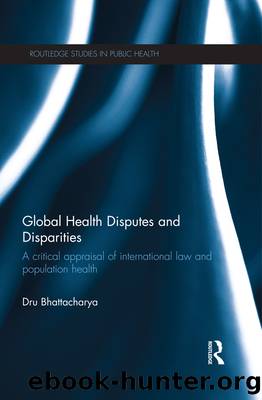Global Health Disputes and Disparities by Bhattacharya Dru;

Author:Bhattacharya, Dru;
Language: eng
Format: epub
Publisher: Taylor & Francis Group
Consider the following observations:
Capability of Life
Nussbaum describes this capability as being able to live to the end of a human life of normal length; not dying prematurely or before oneâs life is so reduced as to be not worth living. To this I would add female valuation and an explicit rebuke of sex-selection and sex-selective abortions. Son-preference has become a scourge of Indian (and particularly Hindu) culture, and it is no longer confined to the borders of India. A recent study found that current trends suggest that Indians in the U.S. may also be engaging in prenatal diagnostic procedures to conceive male children. The tale begins with societyâs preference for males over females, epitomized in King Asvapatiâs desire to have a son, pursuant to the counsel of societyâs learned men and in accordance with paro dharma, or âhighest dharma.â The term dharma is a catchall for law, righteousness, and virtue. Unlike the overly rigid and narrow conception of law in modern society, dharma refuses to be devoid of a moral attribute, though the potential conflict of an individual sense of dharma (svadharma) and a universal and generally applicable sense of dharma (sanatanadharma) is recognized. In fact, this is a central theme of the tale. Here, the conflict concerns the issue of son-preference. Notably, the king was not advised to have a son. The council had advised him that samt_nam was in accordance with the highest dharma. In Sanskrit, samt_nam means âoffspringâ or âprogeny,â not âson.â Thus, the king had not chosen in accordance with the sanatanadharma, but out of his own personal preference. The granting of a daughter in response to his request is a clear rebuke of his misperception. While Savitri herself wishes to have sons later in the tale, she does not conflate her personal wants with the common morality. Female valuation is an explicit theme throughout the tale.
Capability of Bodily Health and Integrity
Being able to have good health, including reproductive health, is indicated by Savitriâs upbringing up to the point where the people, upon seeing her, remark, âWe have received a goddessâ (Ganguli, 1896). There is perhaps no better characterization of adequate nourishment and shelter than a presentation that commands divine comparisons.
Capability of Bodily Integrity
The freedom to move freely, have opportunities for sexual satisfaction and for choice in matters of reproduction are neatly packaged in a series of events. Savitri is given absolute freedom to choose a husband according to her own wishes. She thereupon roams throughout all the kingdoms in search of a suitable partner. Savitri chose Satyavan and upon becoming his wife, attended to him by âindications of her love in private,â the nature of which should not be lost on readers as an indiscriminate allusion to conjugal affairs.
Capability of Senses, Imagination, and Thought
This capability concerns the ability to imagine, think, and reason in a human way that is informed and cultivated by education. For Savitri, this capability is illustrated in a series of acts that encompass her (1) choosing of a husband of her
Download
This site does not store any files on its server. We only index and link to content provided by other sites. Please contact the content providers to delete copyright contents if any and email us, we'll remove relevant links or contents immediately.
The Vaccine Court by Rohde Wayne(1205)
Inside the Criminal Mind by Stanton Samenow(1016)
Lecretia's Choice by Matt Vickers(972)
Babies of Technology by Mary Ann Mason(938)
Deaths of Despair and the Future of Capitalism by Anne Case(879)
Five Last Acts by Chris Docker(876)
America's Bitter Pill: Money, Politics, Backroom Deals, and the Fight to Fix Our Broken Healthcare System by Steven Brill(864)
America's Bitter Pill by Steven Brill(820)
Memoir of a Race Traitor by Mab Segrest(678)
The Collected Tales by Nikolai Gogol(675)
Medical Law: A Very Short Introduction (Very Short Introductions) by Charles Foster(671)
Introduction to Health Care Management by Sharon B. Buchbinder Nancy H. Shanks(662)
Mental Illness, Human Rights and the Law by Brendan D Kelly(662)
Genomic Messages: How the Evolving Science of Genetics Affects Our Health, Families, and Future by George Annas & Sherman Elias(640)
Genomic Messages by George Annas(615)
A New Leaf by Alyson Martin Nushin Rashidian(607)
Pediatric Forensic Evidence by David L. Robinson(606)
Marijuana Law in a Nutshell by Mark Osbeck & Howard Bromberg(599)
In Reckless Hands by Victoria F. Nourse(581)
